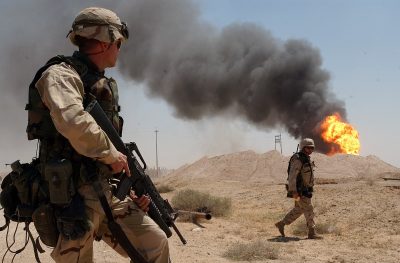The Authorization for Use of Military Force (AUMF): Repeal the Iraq War Authorization. Repeal America’s “Forever Wars”
Congress should reassert its prerogative to end wars.

All Global Research articles can be read in 51 languages by activating the “Translate Website” drop down menu on the top banner of our home page (Desktop version).
To receive Global Research’s Daily Newsletter (selected articles), click here.
Visit and follow us on Instagram, Twitter and Facebook. Feel free to repost and share widely Global Research articles.
***
It has been more than 50 years since Congress repealed an authorization for the use of military force (AUMF)—the legal mandate our legislative branch adopts to allow presidents to conduct combat operations abroad.
The last time Congress revoked an AUMF was in 1971, when public opinion had turned decisively against the Vietnam War. President Nixon had ordered the gradual withdrawal of U.S. forces and the “Vietnamization” of the conflict. He signed the repeal of the Gulf of Tonkin Resolution, content in his capacity as commander-in-chief to protect American combat troops that were then drawing down.
Since that time, Congress has ratified three subsequent AUMFs. In 1991, the Authorization for Military Force Against Iraq initiated Operation Desert Storm.
The Authorization for Use of Military Force of 2001 commenced the invasion of Afghanistan and has, henceforth, undergirded the Global War on Terrorism. Finally, the Authorization for Use of Military Force Against Iraq Resolution of 2002 sanctioned a “shock and awe” campaign and the overthrow of Saddam Hussein.
For the fourth time in as many years, the House of Representatives has moved to repeal the 2002 Iraq War authorization. The legislation now sits in the Senate, where a companion bill passed with bipartisan backing from the Foreign Relations Committee. Now, 49 co-sponsors—including 11 Republicans—support rescinding the authority. Last June, President Biden’s White House also signaled its support for the repeal in a formal Statement of Administration Policy.
Repeal of the 2002 AUMF would represent a modest but nonetheless historic step toward congressional reclamation of its constitutional prerogative to initiate, oversee, and ultimately end foreign conflicts. It would also remind the executive branch and its sprawling national-security state that our legislators hold ultimate sway in matters of war and peace.
No ongoing military operations rely on the 2002 AUMF as their primary legal justification. Rather, the expansive 2001 AUMF provides broad statutory authority for the prosecution of force against Al Qaeda and its affiliates. The current U.S. troop presence in Iraq performs its “advise, assist, and enable” responsibilities at the invitation of the government in Baghdad, with which Washington enjoys diplomatic, if tense, relations.
That our uniformed men and women stationed in Iraq still take incoming fire from hostile factions should hasten congressional deliberation about the purpose, efficacy, and duration of their deployment. But the president’s Article II prerogative to protect Americans from actual and imminent threats offers broad leeway to strike in self-defense.
Meanwhile, all key enemies whom the 2002 AUMF was drafted to defeat are dead and buried. Saddam Hussein met the end of the hangman’s rope in 2006. His sons, Uday and Qusay, were slain in a shootout with American forces in 2003. The Ba’ath Party has been driven deep underground.
So why has this authorization outlived its adversaries?
Put plainly, Congress is comfortable deferring to the executive branch when it comes to war. Having repeatedly failed to bring a vote to the floor in the Senate, the “world’s greatest deliberative body” has proved reluctant to assert its Article I birthright and treasured claim as a coequal branch of government.
Thus, a matter of basic constitutional hygiene—in this case, the repeal of an obsolete war authorization—has been neglected and the legal debate warped. In its deference to the executive, the august upper house has allowed successive administrations to concoct bold new interpretations of the 2002 AUMF. Sometimes it has been cited as an “alternative statutory basis” to operations conducted under the 2001 authorization. More imaginatively, it “reinforces” combat operations beyond the sovereign boundaries of Iraq.
Congress should seize this opportunity to remove an open-ended authorization that may be subject to future executive mischief. Further dereliction of their constitutional duty would be more evidence that our elected officials have little interest in the conduct and conclusion of our wars.
Consecutive administrations came to power promising a change of strategy. As President Donald Trump remarked at the West Point commencement in 2020, “We are ending the era of endless wars…. It is not the duty of U.S. troops to solve ancient conflicts in faraway lands that many people have never even heard of.” President Joe Biden echoed this sentiment when he promised an end to our “forever wars.”
Now, the Senate is presented with an opportunity to make history. Repealing the 2002 Iraq War authorization would be the first action of its kind in half a century. It would begin to restore the Congress’s function as a vital check on executive power and the unelected national-security bureaucracy that boosts these wars. Most importantly, it would exercise legislative muscle that has atrophied over these past 20 years.
Let Congress begin with the low-hanging fruit: end an ended war. Repeal the 2002 AUMF, reclaim some congressional dignity, and perhaps weigh the past and present of America’s long saga in Iraq.
*
Note to readers: Please click the share buttons above or below. Follow us on Instagram and Twitter and subscribe to our Telegram Channel. Feel free to repost and share widely Global Research articles.
Reid Smith is director of foreign policy at Stand Together.
Featured image: U.S. Army guarding Rumaylah Oil Fields, Southern Iraq, 2003. Photo credit: U.S. Navy via WikiMedia Commons

